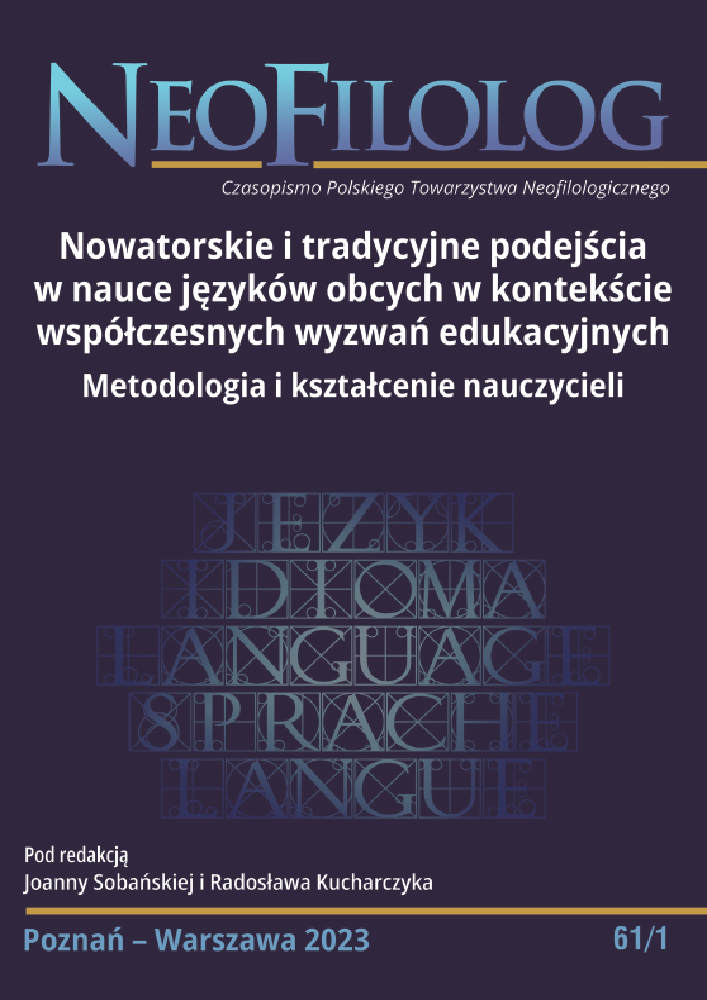Abstract
In the knowledge economy, the memorization of facts and procedures is important but not sufficient. In order to responding to changes in society and the economy it becomes necessary to develop key competences. Competences-oriented education introduces innovative forms of teaching and learning based on the constructivist learning approach, such as the LbT-Method (Learning by Teaching /Lernen durch Lehren/), which gives the students the opportunity to learn by doing.
The article introduces the results of a survey which was conducted during the third semester of a “Grammar in Communication” course at the faculty of Applied Linguistics at Maria Curie-Skłodowska University in Lublin. According to the students’ assessment, their participation in this course enhanced their literacy, multilingual, personal, social and learning-to-learn competences, as well as their entrepreneurial competence. The results of this survey will be used to optimize the course design in the future.
References
Atteslander R. (2003), Methoden der empirischen Sozialforschung. Berlin, New York: Walter de Gruyter.
Beyer K., Krüssel H. (2004), Die Bedeutung der Konstruktivistischen Didaktik, (in:) Beyer K. (Hrsg.), Planungshilfen für den Fachunterricht. Die Praxisbedeutung der wichtigsten allgemein-didaktischen Konzeptionen. Stuttgart: Schneider Verlag Hohengehren GmbH, S. 122–145.
Empfehlung des Rates der Europäischen Union vom 22. Mai 2018 zu Schlüsselkompetenzen für lebenslanges Lernen. Online: https://eur-lex.europa.eu/legal-content/DE/TXT/HTML/?uri=CELEX:32018H0604(01) [abgerufen am 15.06.2023].
European Commission, Directorate-General for Education, Youth, Sport and Culture (2019), Key competences for lifelong learning. Publications Office. Online: https://data.europa.eu/doi/10.2766/569540 [abgerufen am 13.06.2023].
Gold A. (2015), Guter Unterricht. Was wir wirklich darüber wissen. Göttingen: Vandenhoeck & Ruprecht. DOI: https://doi.org/10.13109/9783666701726
Hattie J. (2015), Widoczne uczenie się dla nauczycieli. Jak maksymalizować siłę oddziaływania na uczenie się. Warszawa: Centrum Edukacji Obywatelskiej.
Janicka M. (2019), Effizienz der Methode Lernen durch Lehren (LdL) – Ergebnisse eines Experiments. „Glottodidactica“, Nr. XLVI/1, S. 9–21. DOI: https://doi.org/10.14746/gl.2019.46.1.01
Kelchner R., Martin J.-P. (1998), Lernen durch Lehren, (in:) Timm J.-P. (Hrsg.), Englisch lernen und lehren – Didaktik des Englischunterrichts. Berlin: Cornelsen.
Martin J.-P. (1986), Für eine Übernahme von Lehrfunktionen durch Schüler. „Praxis des neusprachlichen Unterrichts“, Nr. 4/86, S. 395–403. Online: http://www.ldl.de/Material/Publikationen/lehrfunk.pdf [abgerufen am 30.11.2022].
Opis metody LdL, https://www.ore.edu.pl/2011/04/metoda-ldl-69277954/ [abgerufen am 15.06.2023].
Reich K. (2004), Konstruktivistische Didaktik. Lehren und Lernen aus interaktionistischer Sicht. München/ Unterschleißheim: Luchterhand.
Siebert H. (2005), Pädagogischer Konstruktivismus. Lernzentrierte Pädagogik in Schule und Erwachsenenbildung. Weinheim und Basel: Beltz Verlag.
License
Copyright (c) 2023 Monika Janicka

This work is licensed under a Creative Commons Attribution-NoDerivatives 4.0 International License.
Authors
Authors of texts accepted for publication in Neofilolog are required to complete, sign and return to the Editorial team’s office the Agreement for granting a royalty-free license to works with a commitment to grant a CC sub-license.
Under the agreement, the authors of the texts published in Neofilolog grant Adam Mickiewicz University in Poznań a non-exclusive, royalty-free license and authorize the use of Attribution-NoDerivatives 4.0 International (CC BY-ND 4.0) Creative Commons sub-license.
The authors retain the right to the free disposal of the work.
Users
Interested Internet users are entitled to use works that have been published in Neofilolog since 2017, under the following conditions:
▪ attribution – obligation to provide, together with the distributed work, information about the authorship, title, source (link to the original work, DOI) and the license itself.
▪ no derivatives – the work must be preserved in its original form. Without the author's consent, it is not possible to distribute the modified work in the form of translations, publications, etc.
Copyrights are reserved for all texts published since 2017.
Miscellaneous
Adam Mickiewicz University in Poznań retains the property right as a whole (layout, graphic form, title, cover design, logo etc.).

